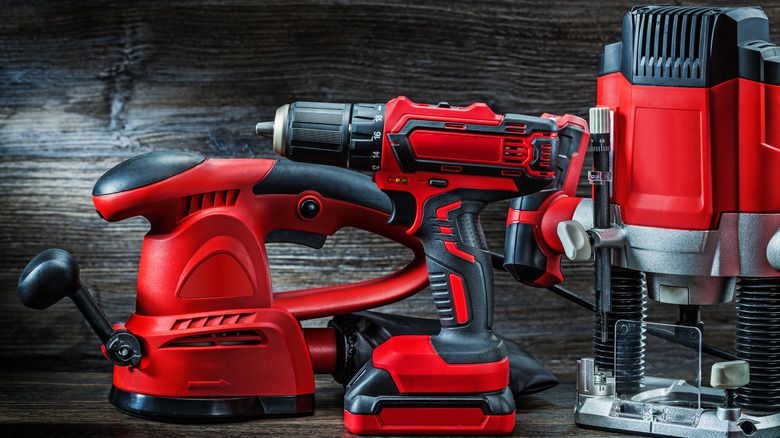Cordless Vs. Corded Power Tools: Which One Is Right For Your Home?
To say that cordless power tools, those powered by batteries, have taken the market by storm is an understatement. Almost 70% of power tool sales in 2023 were cordless tools instead of corded tools, according to a report by the Fredonia Group. A quick stroll down the aisles of a big box store will support that finding. Is that because they are the cool new thing or are they empirically better than the corded variety? What are the downsides of corded and cordless tools and which tasks does each category do better? Can a homeowner guide themselves through these questions?
Electric power tools are labor-saving devices in a variety of genres. Drill/drivers, handheld circular saws, reciprocal saws, sanders, lawn mowers, lawn trimmers, hedge trimmers, leaf blowers, chainsaws, and power washers are all common for the average homeowner, to name a small sampling. The difference between corded and cordless power tools is basically the power source; batteries or a power cord. The motors and other aspects of tool construction are essentially the same. Today, the batteries for these tools primarily use lithium-ion chemistry — a technology that delivers superior results in terms of raw power and energy storage.
The pluses and minuses of using cordless tools in your home
The primary benefit of cordless tools is their freedom of movement. You are not tethered to a power cord (which is then often attached to an electrical extension cord). So, no more power cords to trip over in a shop and no untangling from shrubbery and lawn ornaments. The frustration of getting close to where you need to be working and finding out that you don't have an extension cord long enough to reach is a thing of the past. And while cordless tools may be somewhat less powerful in some instances, the new more powerful battery chemistries and multi-battery tools are fighting against that constraint.
One downside to cordless tools when compared to a roughly equivalent corded tool, is you'll generally pay more for the cordless version due to the cost of the batteries and their chargers. Batteries are a source of other downsides: they run out of power when in use. Unless you have an additional battery charged and ready, you'll be off the job until it's recharged. Batteries will fail at some point and need to be replaced, and they are expensive — often nearly as expensive as the tool itself. A clever consumer will purchase cordless tools that use the same battery style across several varieties to make their cordless tools more effective and economical. Having a collection of tools with different batteries and chargers can frustrating.
Finally, cordless tools can potentially harm the planet. Lithium-ion and cobalt mining can pollute their surroundings. Improper disposal of the batteries can leach chemicals into the soil and ground water. Some batteries use those forever chemicals — PFAS — which aren't environmentally friendly.
Plug it in (or not) for old-school corded power tools
Corded power tools may seem a bit old-fashioned, but they have some serious upsides to consider. Usually, a corded version of a tool will be much less expensive than a cordless model. They provide exceptional power and durability. A name brand corded tool could last a lifetime. And as long as the power grid is up and running and you pay your bills, a corded tool will not run out of power. How you use a tool can make a difference. If you do most of your work in a shop, having a corded chop saw is probably more practical and useful than a cordless version. Plus, corded tools have less negative environmental impact than cordless tools. It can even be argued that they use less energy overall. The energy it takes to charge a battery is more than it can deliver to any specific task.
The downside of corded tools is ... the cords. Being connected to a wall outlet or even a generator can be problematic. There is the tripping problem in a shop or at a job site. Cords get tangled, and if you are using extension cords, they can get exceptionally tangled. With some tools like hedge trimmers or lawn mowers, it's super easy to accidentally cut through the power cord. (That will put a crimp in your schedule!) Sometimes there may be a limited number of power outlets available, making it necessary to unplug and re-plug tools as you need them which can be frustrating. And speaking of plugs, they can get damaged and need to be replaced.


